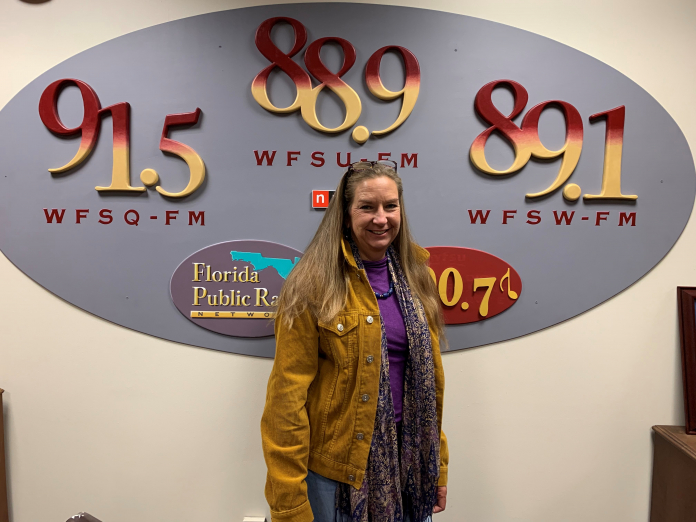People’s personal lives can often times get overlooked by their achievements and work. A lot of journalists have jobs that require them to report the news instead of focusing on the people behind the news. Today, we give three unconventional people the spotlight to show us not just what they do, but who they are at their core.
Karen Cox-Dennis On Her Favorite Title: Mom
“My mother died three days before I graduated high school on her 52nd birthday. She was an incredible woman and the legacy that she left me was to always help people less fortunate than you. So I have always tried to get resources to people that don’t have easy access to them,” said Karen Cox-Dennis, founder of Forgotten Coast Productions.


Over the years she’s held many titles: Executive producer, location scout, non-profit founder, chef and former event coordinator for Michelle Obama. Cox-Dennis has built her career in film and media, but her favorite title, is mother. Her own died when Cox-Dennis was 17. It became a defining moment in her life.
“I loved accessorizing with her, going shopping with her, picking out accessories for movie stars’ homes and antiques and rugs and vases and books for the shelves and everything it was always fun,” said Cox-Dennis.
In a way, Cox-Dennis says she’s walking in her mother’s footsteps. She worked as an interior designer back in their hometown in California.
“Generally speaking all of us need social support, we are social beings right,” says pyschologist Yolanda Bogan. “So when there is a loss of a social support then it is going to be devastating, it’s going to be hurtful to us and it’s important that we find ways to gain social support in different ways.”
Bogan is a mental health counselor with more than 20 years of experience.
Cox-Dennis is the Founder of The Apalachicola Parks Foundation & Children’s Fund. She says she tries to be that support for her daughter and other women in the community. It’s a value she learned from her mother.
“She left me with a legacy of giving and I feel I passed that on to my daughter who’s the student ambassador for United Way and I try and encourage woman to take their place in this world and to not see any obstacles but to see opportunities,” said Cox-Dennis.
Meet Ian Carter: From High School Dropout To Science Scholar 

Ian Carter recently transferred to Florida State University after attending Tallahassee Community College. During a recent event at TCC, Carter was praised for his work inside the classroom. And while he’s found academic success, his path to get to where he is now hasn’t been very traditional.
“I had some anxiety issues and so that’s where I started on homeschooling and virtual schooling and they had a program in Florida called homebound where teachers would actually come to your house and I just didn’t learn really good that way,” he says.
Carter dropped out of high school his junior year due to severe social anxiety. Years later, he decided to continue his education. He earned a GED and began taking classes at TCC. He says if he could undo anything from his past, he would have stayed in school. But the social anxiety he suffered from grew to be too much.
“Anxiety has to do with avoidance and people who have anxiety avoid different things. Sometimes people have specific phobias where they avoid certain things and sometimes people have anxieties where they avoid places, they may avoid being alone, they may avoid people for fear of how they may be evaluated by them,” said Bogan. “So what we want to do is make sure that people are able to engage in life’s activities so that they can enjoy life more and have a better quality of life.”
Carter says his major battle was with himself. He says he had to learn to be more mature and confront his issues head-on.
“Since I’m religious just reading the bible and those biblical figures. They help me to keep pushing, help my beliefs, reading a lot of proverbs. Knowing how to deal with people on a day-to-day basis has helped me,” he says.
Carter is also driven by his desire to help other people through technology and his outlook today is far different from where it used to be.
“I believe that any bad thing that happens is a living and learning kind of moment so I don’t take it as oh this bad thing happens to me I’m just not going to do anything I take it as oh what can I learn from this. I look at my past as what can I learn and what can I improve to get better for the future.”


Tia Smith: Future Pharmacist
When Tia Smith was 14, doctor’s gave her a diagnosis that would change her life. She learned she had Lupus, a disease where the body attacks itself.
“Basically it happens whenever it feels like it wants to happen it’s an invisible disease, you can’t see it, but you can feel it and you won’t know a person has it unless a their skin is really affected and they get a butterfly rash on their face,” she says, describing the disease. “Basically the medication I take is to suppress my immune system because my immune system is attacking my major organs. I don’t have an immune system to help me fight off different germs and stuff.”
About three months into her freshman year of college, Smith got sick. The Broward county native was by herself in Tallahassee, and the friends she had—well, they didn’t really understand exactly how ill she was.
“It was…almost to Thanksgiving and I was in the hospital for a week and the friends that I did have didn’t know I was in the hospital because they were just too busy with their own life,” says Smith. “They called me and was like ‘oh Tia lets go out’ and I’m like ‘well, I’ve been in my room for three days and I cannot move and I’m going to go home because I cannot stay here.”
She felt like she wouldn’t survive. “I was going to die in that room.”
Her self-esteem plummeted. Lupus can cause weight gain and facial rashes, and Smith felt as if people were staring at her, wondering why she was being wheeled around campus in a golf cart. She was in both physical and emotional pain. So, she started experimenting with art—specifically, make-up. It made her feel better about herself and she discovered it did the same for others.
“Do not give up, do not lay down and just keep going because it’s going to get better,” she says about her approach to advising others who may be going through something similar.
Bogan says she believes people have to be reminded that while people are individuals and have differences, culture is extremely important in shaping who they are and sometimes they assume that there’s a one size fits all, and that is not the case.


Yolanda Bogan On Treating the Body vs. The Mind
Bogan was inspired to pursue psychology when she noticed in middle school that the people around her weren’t just physically sick but mentally and emotionally as well.
“I saw that the response to people who had mental health challenges was very different from folks who had physical health challenges and I thought that was not right. I thought there was a problem with that and I didn’t understand why there was a difference,” she says.
“Certainly with physical health, there’s usually a broken bone or something that’s quite [obvious], that says that that person is ill. But with mental illness, you can observe that people are not doing well but the community’s response was less supportive, less concerning, and I wanted to make a difference in that regard.”
Karen Cox-Dennis, Ian Carter, Tia Smith, and Yolanda Bogan are everyday people who are products of their environment and life experiences, but instead of using it as an excuse… they use it to fuel their passion.
9(MDA4MzU1MzUzMDEzMTkyMzAwMzY5MjY1Mw004))
9(MDA4MzU1MzUzMDEzMTkyMzAwMzY5MjY1Mw004))


